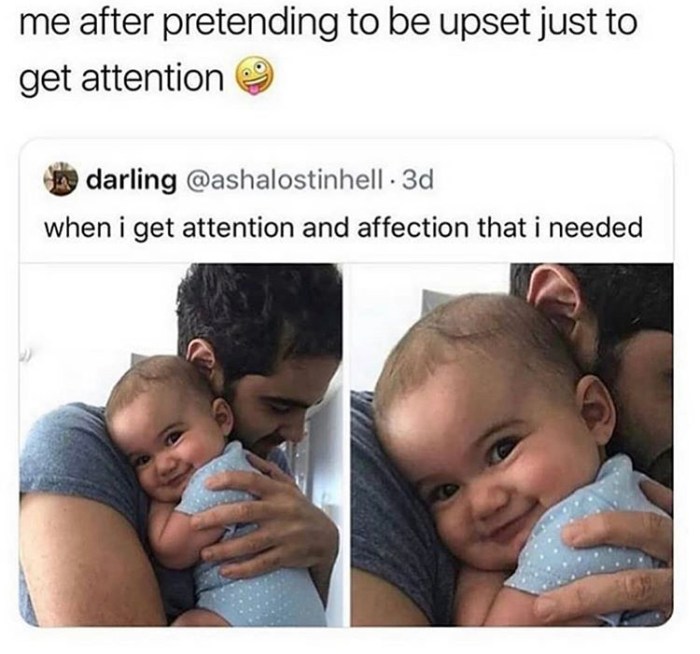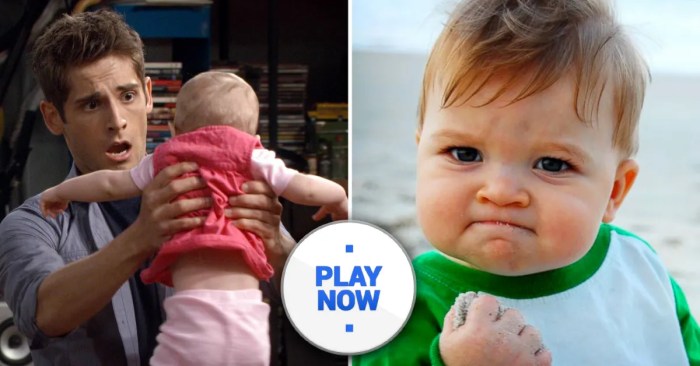Should i be babied quiz – Step into the world of self-discovery with our captivating “Should I Be Babied?” quiz. Dive deep into the realm of emotional maturity, boundaries, and personal growth as we explore the delicate balance between nurturing and enabling.
Embark on a journey of self-reflection and uncover the hidden truths that lie within. This quiz will guide you towards a profound understanding of your emotional needs and empower you to take charge of your own life.
Self-Reflection and Emotional Maturity

Emotional maturity is the ability to manage and regulate emotions effectively. It involves understanding and accepting your own emotions, as well as those of others. Being babied, or overly cared for, can hinder emotional growth by preventing individuals from developing these skills.
Developing emotional maturity brings several benefits. It enables individuals to make rational decisions, build healthy relationships, and cope with stress more effectively. It also promotes self-reliance and independence, as individuals learn to take responsibility for their actions and emotions.
Situations Where Being Babied Hinders Emotional Growth
There are various situations where being babied can hinder emotional growth. These include:
- Overprotection:When parents or caregivers are overly protective, they may prevent children from experiencing natural consequences and learning from their mistakes. This can lead to a lack of resilience and self-confidence.
- Lack of Boundaries:If boundaries are not clearly established, individuals may become overly dependent on others and struggle to develop a sense of self-reliance. They may also find it difficult to manage their emotions and set appropriate limits with others.
- Enabling:Enabling occurs when individuals are constantly bailed out of difficult situations. This can lead to a sense of entitlement and a lack of motivation to develop coping mechanisms and problem-solving skills.
Boundaries and Independence: Should I Be Babied Quiz

Establishing healthy boundaries is crucial in any relationship. They define the limits of acceptable behavior, protect our physical and emotional well-being, and foster mutual respect. When boundaries are blurred or non-existent, codependency can develop, creating unhealthy patterns and hindering personal growth.
Being babied can erode boundaries. When someone constantly takes on the role of caretaker, it can create a dynamic where the individual being babied becomes dependent and loses the opportunity to develop self-reliance. This can lead to a sense of helplessness and a lack of confidence in one’s own abilities.
Establishing Clear Boundaries, Should i be babied quiz
- Communicate your needs and expectations clearly and directly.
- Learn to say no to requests that violate your boundaries.
- Enforce consequences for boundary violations.
Fostering Independence
- Encourage the individual to take on responsibilities and challenges.
- Provide support and guidance, but avoid doing things for them.
- Celebrate their successes and acknowledge their efforts.
Self-Esteem and Confidence

Being babied can severely undermine self-esteem and confidence. When individuals are constantly treated as incapable, they begin to internalize this message and doubt their own abilities.
This lack of self-belief can have a detrimental impact on various aspects of life, including academic performance, career aspirations, and personal relationships. Individuals who lack confidence may avoid challenges, set lower goals, and give up easily when faced with obstacles.
Building Self-Esteem
Building self-esteem and developing a sense of competence are crucial for overcoming the negative effects of being babied. Here are some tips to help you achieve this:
- Identify your strengths and accomplishments: Focus on your positive qualities and the things you do well. Write them down or share them with a trusted friend or family member.
- Set realistic goals: Don’t try to do too much at once. Break down large tasks into smaller, more manageable steps. Celebrate your successes, no matter how small.
- Challenge negative thoughts: When negative thoughts about your abilities arise, question their validity. Look for evidence to support your positive qualities.
- Surround yourself with supportive people: Surround yourself with individuals who believe in you and encourage you to grow.
- Seek professional help if needed: If you struggle to build self-esteem on your own, consider seeking professional help from a therapist or counselor.
Growth and Development

Personal growth and development are crucial for a fulfilling and meaningful life. Embracing challenges and setbacks is essential for this journey, as they provide opportunities for learning, resilience, and self-discovery.
Overcoming Obstacles
When faced with challenges, we are forced to step outside our comfort zones and tap into our inner resources. Overcoming obstacles builds confidence, perseverance, and the ability to adapt to changing circumstances. It also helps us develop problem-solving skills and fosters a sense of accomplishment.
Learning from Mistakes
Mistakes are an inherent part of the learning process. When we are babied, we are shielded from potential failures, which deprives us of valuable opportunities for growth. Making mistakes allows us to identify areas for improvement, develop coping mechanisms, and become more resilient in the face of adversity.
Embracing Challenges
Challenges can be daunting, but they also offer tremendous potential for personal growth. By embracing challenges, we push our limits, expand our capabilities, and unlock our full potential. Each challenge overcome is a step towards becoming a more capable, resilient, and confident individual.
Relationships and Dynamics

When one person is being babied in a relationship, it can create an unhealthy power dynamic. The person being babied may feel infantilized and dependent, while the person doing the babying may feel superior and in control.
This imbalance of power can lead to a number of problems, including:
- Resentment:The person being babied may resent the other person for treating them like a child.
- Control:The person doing the babying may use their power to control the other person’s behavior.
- Lack of intimacy:The relationship may lack intimacy and passion because the person being babied is not seen as an equal partner.
If you’re in a relationship where you feel like you’re being babied, it’s important to talk to your partner about it. Explain how their behavior is making you feel and what you need from them to feel more respected and equal.
If your partner is willing to listen and change their behavior, then the relationship may be able to improve. However, if they’re not willing to change, then you may need to consider ending the relationship.
So, you’ve taken the “Should I Be Babied?” quiz and now you’re wondering what’s next. Well, if you’re looking to learn more about Spanish, you might want to check out the asi se dice level 2 pdf . This free resource can help you improve your Spanish skills, so you can start understanding the language like a native speaker.
And who knows, maybe you’ll even be able to pass the “Should I Be Babied?” quiz in Spanish!
Fostering Healthy Relationships
Here are some strategies for fostering healthy relationships based on respect and equality:
- Communicate openly and honestly:Talk to your partner about your needs, wants, and feelings. Be honest about how their behavior is affecting you.
- Respect each other’s boundaries:Don’t try to control your partner’s behavior or make them do things they don’t want to do.
- Support each other’s growth:Encourage your partner to grow and develop as a person. Don’t try to hold them back or make them feel like they’re not good enough.
- Be there for each other:Be there for your partner when they need you, and let them know that you care about them.
Specific Examples and Case Studies

Being babied can have severe consequences, as demonstrated by real-life examples and case studies.
One common negative outcome is stunted emotional growth. Individuals who are constantly shielded from challenges and responsibilities may fail to develop the necessary resilience and coping mechanisms to handle life’s difficulties.
Case Study: Stunted Emotional Growth
- A study by the University of California, Berkeley, followed a group of overprotective parents and their children over a period of 10 years. The results showed that the children who were constantly babied had significantly lower levels of emotional maturity and independence than their peers.
Another negative consequence of being babied is a lack of self-confidence. Individuals who are not given the opportunity to make their own decisions and take risks may develop a belief that they are incapable of doing so.
Case Study: Lack of Self-Confidence
- A study by the University of Michigan found that individuals who were raised by overprotective parents had lower levels of self-esteem and were more likely to experience anxiety and depression.
However, it is possible to overcome the negative effects of being babied and achieve independence. Case studies of individuals who have done so provide valuable lessons.
Case Study: Overcoming Negative Effects
- One such case study is that of a young woman named Sarah. Sarah was raised by a single mother who was extremely protective. As a result, Sarah had difficulty making decisions for herself and was constantly seeking her mother’s approval.
- After graduating from college, Sarah decided to move to a new city and start a new job. This was a major step for her, but she was determined to become more independent.
- With the support of a therapist, Sarah began to challenge her negative beliefs about herself. She also started taking on more responsibilities at work and in her personal life.
- Over time, Sarah’s self-confidence grew and she became more independent. She is now a successful businesswoman and is happily married with two children.
The lessons learned from these examples and case studies are clear: being babied can have negative consequences, but it is possible to overcome these effects and achieve independence.
FAQ Section
What is emotional maturity?
Emotional maturity refers to the ability to manage and regulate emotions effectively, maintain healthy relationships, and cope with challenges in a constructive manner.
How does being babied affect self-esteem?
Being treated as incapable can undermine self-belief and lead to feelings of inadequacy and low self-worth.
What are the benefits of setting healthy boundaries?
Establishing clear boundaries helps maintain respect, prevent codependency, and fosters independence.
How can I build self-esteem and confidence?
Engage in self-reflection, set realistic goals, celebrate your achievements, and surround yourself with supportive individuals.